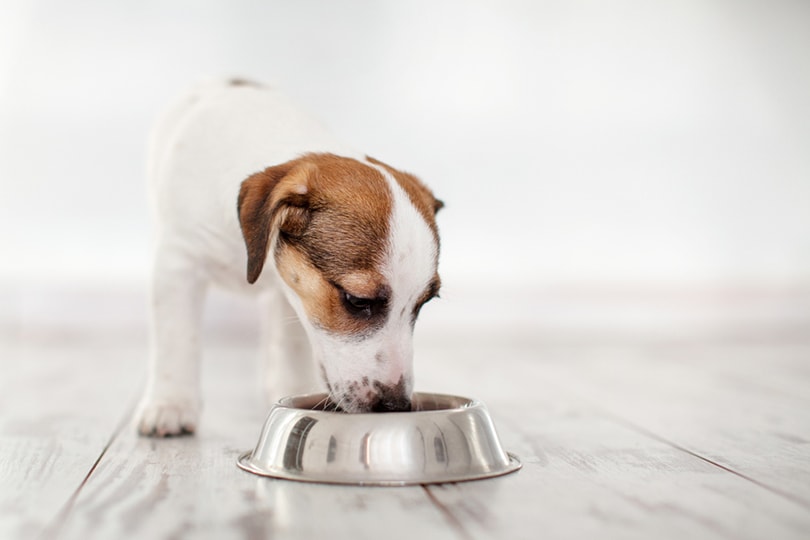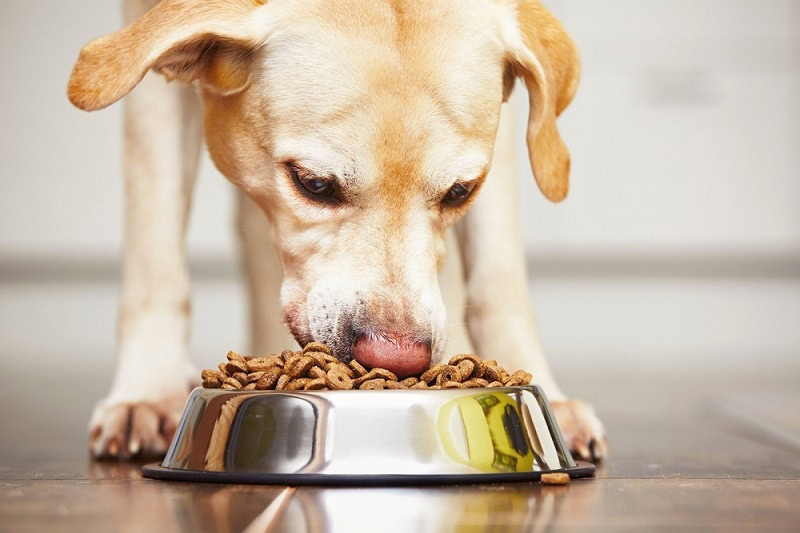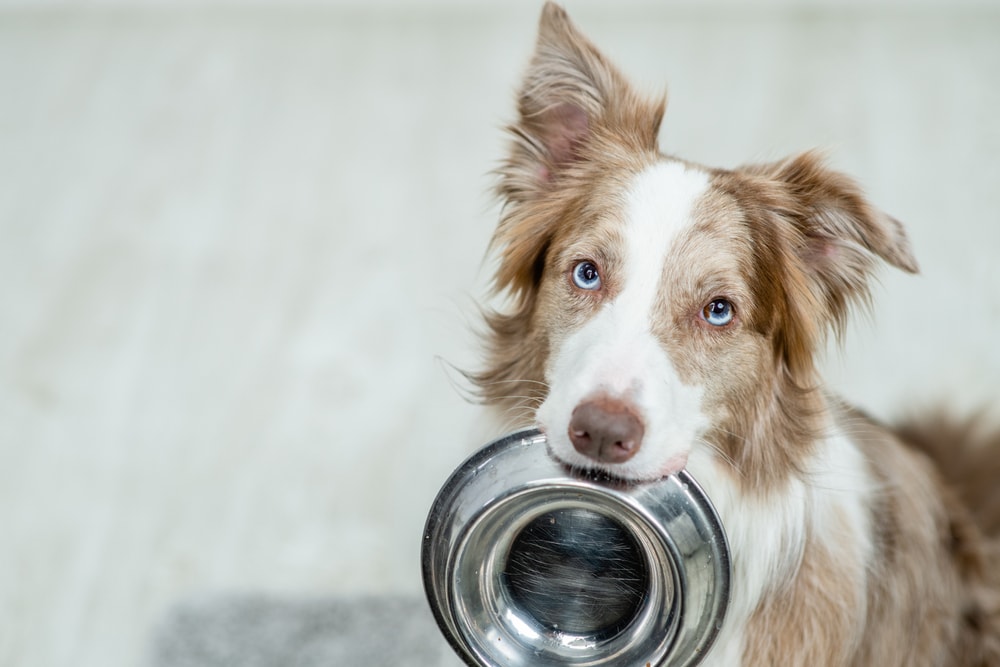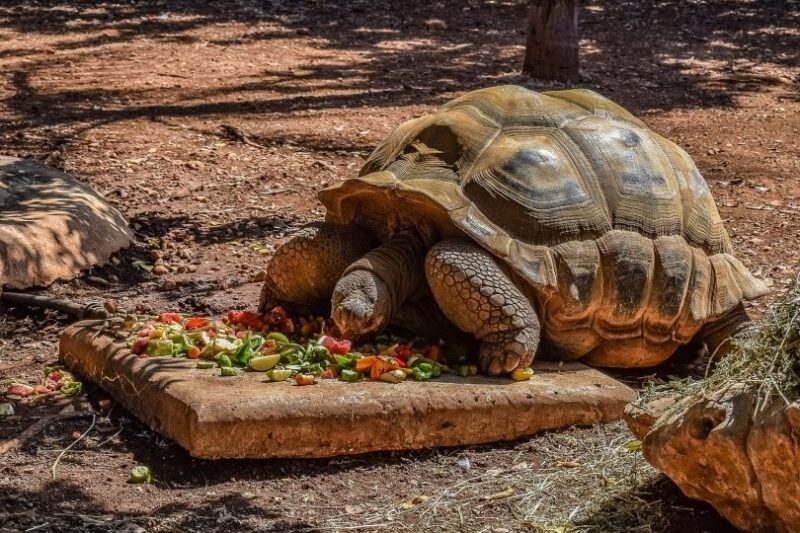VET APPROVED

The information is current and up-to-date in accordance with the latest veterinarian research.
Learn more »Click to Skip Ahead
Dogs are the perfect pets for people of all ages, and they come in a variety of shapes and sizes. Regardless of the breed or age of your dog, it is important to provide them with a diet that meets their specific nutritional needs.
You might be wondering if an adult dog can eat puppy food. The answer is yes, but for most adult dogs, it is not the ideal diet and may lead to health issues in the long term. Puppy food is higher in calories and fat than adult dog food, which is why it is not recommended for adult dogs unless they have a specific need for it, such as pregnancy or breastfeeding.

Is Puppy Food Safe for Adult Dogs?
Puppy food is perfectly safe for dogs of all ages. The recipes do not contain harmful ingredients, and occasionally, feeding it to an adult dog is relatively safe. However, while puppy food is safe for dogs of all ages, it is not the ideal diet for most adult dogs.
Puppies have different nutritional needs than adult dogs because they are growing and developing rapidly. Puppy food is typically higher in calories and protein than adult dog food to help support their growth.
Puppy food also contains more essential minerals and vitamins for a puppy’s development, such as calcium and phosphorus.

Adult Food vs Puppy Food
- Calories: The average puppy food contains 300–400 calories per cup, whereas adult dog recipes have an average of 200–400 calories per cup. Many adult dogs only need about 300 calories per day, so feeding them puppy food can cause them to gain weight, particularly in small or inactive breeds.
- Protein: On average, puppy foods contain 22%–32% protein, while adult dog foods have 18%–28% protein. Puppies need more protein than adult dogs since they are growing and developing muscles. Excess protein may be harmful to adult dogs with underlying kidney or liver issues, as it can put additional strain on these organs.
- Fats: Puppy foods have 8%–16% fat on average, whereas adult dog foods have 5–15% fat. Fat is a concentrated source of energy and helps puppies grow and develop. Adult dogs do not need as much fat in their diet, and too much fat can lead to weight gain.
Long-Term Risks
While an adult dog can technically eat puppy food, it is not the ideal diet for them. Puppy food is too high in calories and fat for most adult dogs, which can lead to weight gain if fed regularly.
It is best to feed your adult dog an adult-formulated food. If you are unsure what to feed your dog, consult a veterinarian for recommendations.
Can Puppies Eat Adult Dog Food?
While it is not recommended to feed puppies adult dog food on a regular basis, they can eat it on occasion without any harm. The main difference between puppy food and adult dog food is the calories and protein content. Puppy food is higher in both nutrients to support their growth and development.
Adult dog food does not contain the same levels and may not provide puppies with everything they need to grow and develop properly. Specially formulated puppy diets are the best option for puppies, as they are designed to meet their unique nutritional needs.


How Dogs Nutritional Requirements Change Through Their Lives
Your dog goes through several developmental stages in their life, and their nutritional needs change. A dog’s diet is the basis of their metabolism and sustains their life processes, which is why it is so important to understand their needs at each stage.
The length of a dog’s life stage depends on their breed, specifically the size of their breed. For example, giant breeds are considered puppies for up to 2 years and should be fed puppy food, while small breeds can transition to adult food at 10 months old.
| Dog Size | Puppy | Adult | Senior | Geriatric |
| Small (up to 20 pounds) | Up to 10 months | 10 months–10 years | 10–16 years | 16+ years |
| Medium (21–50 pounds) | Up to 1 year | 1–9 years | 9–13 years | 13+ year |
| Large (51–100 pounds) | Up to 15 months | 15 months–7 years | 7–12 years | 12+ years |
| Giant (100+ pounds) | Up to 24 months | 2–6 years | 6–9 years | 9+ years |
Puppy
Puppyhood is a crucial time when dogs grow and develop rapidly. Puppies need a diet high in calories and nutrients to support this growth. Puppy food has more calories than adult dog food and is more easily digestible. It’s also fortified with more essential vitamins and minerals to support your puppy’s growth and development.
Adult
As your dog reaches adulthood, their metabolism will start to slow down, and they will begin to burn fewer calories. This is why switching to adult dog food is crucial once they reach maturity. Adult dog food is typically lower in calories and fat than puppy food and is more nutritionally balanced.
Senior
As your dog enters their senior years, their caloric needs decrease even further. Senior dog food is typically designed to meet the specific nutritional needs of older dogs, such as joint support or weight control.
In the later years of a dog’s life, it is essential to maintain a nutritionally balanced diet to keep them healthy and active.

Pregnancy/Lactation
If your female dog is pregnant or nursing, she will have increased caloric and nutritional needs. Pregnant and nursing dogs should be fed a diet rich in protein and fat to support the puppies’ growth.
Many veterinarians recommend serving puppy food during her pregnancy and while she is nursing, as this will provide her with the extra calories and nutrients she needs.
Even past pregnancy, as she lactates and nurses, she will need more calories than she did prior to becoming pregnant, so puppy food can be continued for a few months postpartum. This diet not only sustains her but also her puppies via her milk supply.
Intact or De-sexed
Intact (not spayed or neutered) dogs have different nutritional needs than those that have been spayed or neutered. Intact dogs require more calories and protein to support their reproductive organs, as well as their overall growth and development.
On the other hand, spayed and neutered dogs have a reduced need for calories and protein since they no longer have reproductive organs. Make sure you’re feeding your dog the right amount and type of food for their lifestyle; check out our dog food calculator here:
The exact amount of calories an individual animal needs to maintain a healthy weight is variable and influenced by many factors including genetics, age, breed, and activity level. This tool is meant to be used only as a guideline for healthy individuals and does not substitute veterinary advice

Final Thoughts
Just like humans, dogs go through many stages in their lives. At each point, their bodies have different nutritional requirements. It is important for dog owners to be aware of these changes and to adjust their pups’ diets accordingly.
Puppy food is ideal for puppies since they need the extra calories and nutrients to support their growth. Once they reach adulthood, it is time to switch them to an adult diet. While there are general guidelines for what type of food to feed your dog at each life stage, it is always best to consult your veterinarian to ensure you provide your dog with the best possible nutrition.
- https://vcahospitals.com/know-your-pet/feeding-the-pregnant-dog
- https://www.akc.org/expert-advice/dog-breeding/care-feeding-breeding-bitch-prebreeding-parturition/
- https://www.aspca.org/pet-care/dog-care/dog-nutrition-tips
- https://www.petmd.com/dog/centers/nutrition/evr_dg_dangers_of_high_protein_dog_foods
- https://www.purina.com/articles/puppy/feeding/how-long-to-feed-puppy-food
- https://vcahospitals.com/know-your-pet/feeding-growing-puppies
- https://vcahospitals.com/know-your-pet/overweight-obesity-and-pain-in-dogs-overview
- https://vcahospitals.com/know-your-pet/obesity-in-dogs
- https://www.ovrs.com/blog/feed-my-pregnant-dog/
- https://www.petmd.com/blogs/nutritionnuggets/dr-coates/2016/january/whats-difference-between-adult-dog-food-and-puppy-food
- https://www.aspca.org/pet-care/dog-care/dog-nutrition-tips
- https://www.countryliving.com/life/kids-pets/a3407/feeding-adult-dog-puppy-food-0610/
- https://thepets.net/can-older-dogs-eat-puppy-food/
- https://www.quora.com/Is-it-OK-to-feed-puppy-food-to-an-adult-dog
- https://www.dogfoodadvisor.com/forums/topic/feeding-adult-dogs-puppy-food/
- https://www.purina.com/articles/puppy/feeding/how-long-to-feed-puppy-food
- https://breedingbusiness.com/can-adult-dogs-eat-puppy-food/
Featured Image Credit: Emolaev Alexander, Shutterstock












